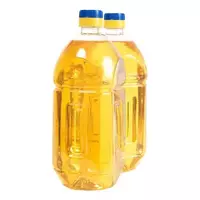Unrefined vegetable oil

Over the past decades, the debate over the benefits or harms of unrefined vegetable oil has not subsided. In addition, unrefined types of vegetable oils are constantly compared with refined types of the product that have undergone additional purification. It is worth noting that it is possible to talk about the negative impact or benefits of unrefined vegetable oil only in a culinary way. The thing is that in the process of refining or additional purification, the ratio of fats and amino acids of natural origin in vegetable oil does not change.
Benefits of unrefined oil
This means that the benefit of unrefined vegetable oil will be exactly the same as the refined type of product. The logical question arises, why then you need additional purification or the process of refining vegetable oils. The main and main reason is the taste of vegetable oil. We think any hostess knows that non-redesigned vegetable oil has a specific smell, and is also poorly suited for thermal cooking of food.
It is believed that unrefined vegetable oil will benefit the human body the most as a dressing in salads made from fresh vegetables and herbs. Moreover, unrefined vegetable oil can become a kind of secret ingredient that will give the dish a special taste and aroma.
Damage to non-refined oil
However, when frying, there is more harm from non-redesigned vegetable oil than good. The fact is that during temperature exposure, excess moisture in unrefined oil increases and foam begins to form inevitably. It is also worth noting that it is important to take into account such a parameter as the smoke temperature of vegetable oil. For example, unrefined vegetable oil begins to smoke at 107S, for comparison refined at 232S.
This means that if you decide to give meat in fragrant non-refined oil, then most likely hopelessly spoil the product, as well as blow out your apartment and weather the unpleasant smell for a long time. In the food industry, there is a special classification of unrefined vegetable oil. there is a higher, first and second grade of the product, which differ not only in their taste and aroma, but also in consumer characteristics.
It is noteworthy that in Russia from ancient times they used unrefined vegetable oil, which by that time was considered lean food. In Lent, butter was replaced with unrefined vegetable oil. Currently, almost all types of vegetable oils are produced in refined and unrefined form. Nutritionists, as well as culinary professionals, argue that it is better to use non-redesigned oil to prepare dishes that do not need cooking. In addition, unrefined vegetable oil can be used to prepare fragrant sauces that are served with meat dishes.
unrefined vegetable oil 899 kCal
Energy value of unrefined vegetable oil (Ratio of proteins, fats, carbohydrates - ju):
Proteins: 0 g (~ 0 kCal)
Fats: 99.9 g (~ 899 kCal)
Carbohydrates: 0 g (~ 0 kCal)
Energy ratio (b | y): 0% | 100% | 0%
 Español
Español Français
Français Português
Português Русский
Русский 简体中文
简体中文 繁體中文
繁體中文 日本語
日本語 한국어
한국어 العربية
العربية Türkçe
Türkçe Қазақ
Қазақ Deutsch
Deutsch Italiano
Italiano Українська
Українська
